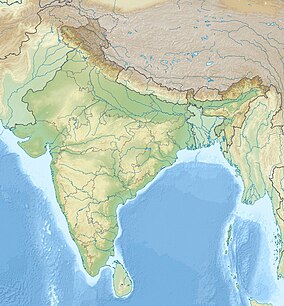Murlen National Park
| Murlen National Park | |
|---|---|
Map of India | |
| Location | near the Myanmar border in Champhai District, India |
| Coordinates | 23°37′01″N 93°18′00″E / 23.61694°N 93.30000°E |
| Area | 200 km2 (77 sq mi) |
| Established | 1991 |
Murlen National Park is a national park located in the Champhai district Mizoram in India. The size of the park area is 200 km2 (77 sq mi).[1] The park is situated about 245 km east of Aizawl, and is close to the Chin Hills. It lies north of Lengteng Wildlife Sanctuary in the same district.[2] It covers an area of approximately 100 km2. The tropical, semi-evergreen and sub montane Forests of Murlen are home to a rich variety of flora and fauna. About 15 species of mammals, 150 species of birds, 35 species of Medicinal plants, 2 species of bamboos, and 4 species of orchids so far have been recorded in this Park.[3] In 2012, 36 people were involved in conservation work of Murlen National Park.[4]
History
Murlen National Park is at Murlen Village, which is the Village of Saithuama Sailo, Chief of Hnahlan.[5] It is a part of Hnahlan Village. Murlen National Park was declared in 1991.[6]
Flora
Only about 1% of the sun's rays can penetrate the forest on a sunny day. So the thickness of the forest in the park is generally compared to the forest found in the Amazon region in South America. Some of the trees found in the park are as old as 350 years. There is an area in the park where not even a single sun's ray can penetrate. And for this reason the area has been known as ‘losing area of seven fellow-men’ or land of no return.[7] The vegetation is admixture of Quercus, Schima wallichii, Betula, Michelia champaca, Pinus kesiya, Prunus, Myrica, Rhododendron, Chimonobambusa callosa, canes and a variety of orchids and lichens.[8] Two species of Ceropegia belonging to the Asclepiadaceae plant family have been discovered in Murlen National Park,[9] These two species of plants have been named as Ceropegia mizoramensis and Ceropegia murlensis which are derived from the state and the locality of Park.[10]
Fauna
Fauna found here include the tiger, leopard, sambar, barking deer, Malayan giant squirrel, Himalayan black bear, serow, hoolock gibbon, rhesus macaque, Hume's pheasant, kalij pheasant, grey partridge, hill myna, and dark-rumped swift.[citation needed] Cases of Hunting and poaching have been reported in Murlen National Park. Many efforts have been taken up by the state government to prevent it.[11]
References
- ^ Das, Chhanda (2007). A Treatise On Wildlife Conservation In India. Biswajit Das. ISBN 9788187616221.
- ^ "Lengteng Wildlife Sanctuary". BirdLife International. Archived from the original on 13 April 2014. Retrieved 11 April 2014.
- ^ "Murlen National Park, Champhai". Native Planet. Retrieved 16 January 2019.
- ^ "Lui dunga ngaw humhalh buaipui mek". Vanglaini. Retrieved 22 August 2012.
- ^ "lesser known facts about 'Murlen National Park' in Mizoram". The Northeast Today. Retrieved 16 January 2019.
- ^ "List of National Parks in India". Centre for Ecological Sciences Indian Institute of Science. Retrieved 22 August 2012.
- ^ "Murlen National Park and the Losing Area of Seven Fellow-Men". India-north-east.com. Archived from the original on 17 June 2013. Retrieved 22 August 2012.
- ^ Logesh; et al. (2015). "Studies on Lichens of Mizoram, Northeast India". Proceedings of the National Academy of Sciences, India Section B: Biological Sciences. 87 (2): 445–457. doi:10.1007/s40011-015-0592-z. S2CID 44247416.
- ^ "Rare plants found in Mizoram". Telegraph India. Retrieved 16 January 2019.
- ^ "Two Rare Plants Discovered in Mizoram". Sentinel Assam. 23 August 2018. Retrieved 16 January 2019.
- ^ "Hunters on the prowl in national park". Oneindia. Retrieved 22 August 2012.

